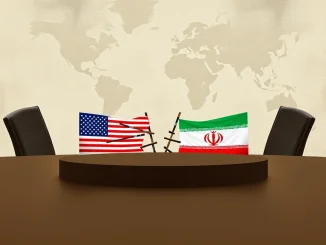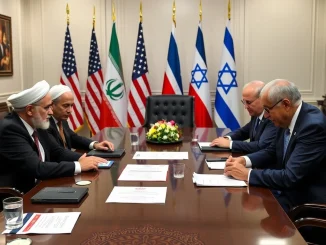
Geopolitical events, especially those involving major regional powers, often send ripples through global markets, including the often-volatile world of cryptocurrency. Understanding the dynamics of conflicts, such as the ongoing Israel Iran Conflict, is key to grasping potential shifts in market sentiment. Recent statements from Israeli Prime Minister Benjamin Netanyahu have put the spotlight squarely back on the Iran Nuclear Program and the conditions under which hostilities might cease.
Netanyahu Iran Policy: A Conditional Halt?
In a significant interview, Israeli Prime Minister Benjamin Netanyahu outlined a potential pathway to de-escalation. He indicated that Israel is prepared to halt its military campaign if Iran agrees to comply with specific demands from the United States. These demands center on Iran completely dismantling its nuclear program. This statement represents a clear condition set by Israel for ending its actions, linking military operations directly to the nuclear issue.
The Prime Minister’s comments underscore the critical importance Israel places on preventing Iran from obtaining nuclear weapons capabilities. It positions the nuclear program as the central point of contention driving the current tensions and actions.
Urgent Warnings on the Iran Nuclear Program
A key factor driving Israel’s stance is intelligence regarding the speed of Iran’s nuclear advancements. According to Netanyahu, intelligence shared with the U.S. suggests Iran is making rapid progress towards developing a nuclear weapon. The assessment indicates Iran could potentially produce a testable or operational device within approximately one year. This timeline highlights the urgency perceived by Israel and its allies regarding the nuclear program.
Such intelligence assessments directly inform the strategic decisions and operational activities undertaken by Israel, aiming to counter what it views as an existential threat. The perceived acceleration of the program increases the stakes in the Israel Iran Conflict.
Shadowy Operations Amidst Middle East Tensions
The public statements occur against a backdrop of reported covert activities. Reuters has cited two Gulf sources claiming that at least 14 Iranian nuclear scientists have been killed in operations attributed to Israel. These incidents reportedly include methods such as car bombings.
While not officially confirmed by Israel, such reports align with a long-standing pattern of alleged efforts to impede Iran’s nuclear progress through clandestine means. These actions, whether confirmed or not, contribute significantly to the overall Middle East Tensions and the complex, undeclared conflict between Israel and Iran.
What Does This Mean for Nuclear Deal Negotiations?
Netanyahu’s explicit condition — halting the campaign if Iran dismantles its nuclear program per U.S. demands — implicitly addresses the status of potential Nuclear Deal Negotiations. The original Joint Comprehensive Plan of Action (JCPOA) significantly restricted Iran’s nuclear activities in exchange for sanctions relief, but the U.S. withdrew from the deal in 2018.
Israel has historically opposed the JCPOA, viewing it as insufficient to prevent Iran from eventually developing nuclear weapons. Netanyahu’s current position suggests that merely returning to or renegotiating a similar deal might not be enough; the demand is for complete dismantlement, a much higher bar than the restrictions sought in previous negotiations. This could complicate any future diplomatic efforts aimed at reviving or establishing new Nuclear Deal Negotiations.
Conclusion: Navigating Uncertainty
Prime Minister Netanyahu’s recent comments provide a direct insight into Israel’s conditions for de-escalating the Israel Iran Conflict: the complete abandonment of the Iran Nuclear Program. This stance is informed by intelligence suggesting rapid progress towards a weapon and occurs amidst reports of covert actions targeting Iranian scientists. These developments contribute to significant Middle East Tensions and cast a long shadow over the possibility of future Nuclear Deal Negotiations.
For global markets, including cryptocurrency, such geopolitical flashpoints introduce uncertainty. The potential for escalation or, conversely, a significant de-escalation based on Iran’s response to the U.S. demands, can influence investor sentiment and market volatility. Staying informed about these critical international developments remains important for understanding the broader risk landscape.



